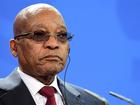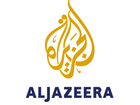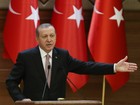South African President Jacob Zuma called for strengthening his country's economic ties with Saudi Arabia, during a visit to the kingdom on Sunday.
"While our political relations with Saudi Arabia are strong, our economic and trade ties should be reviewed and revitalized," he said in a statement.
 Full Story
Full Story
Qatar's state-funded broadcaster Al-Jazeera on Sunday announced a fresh round of job cuts with around 500 positions being lost, most of them at the network's Doha headquarters.
On top of existing losses of 700 jobs following an announcement earlier this year that Al-Jazeera America is to close, it means the broadcaster is set to shed more than 20 percent of its global workforce.
 Full Story
Full Story
Six suicide attacks in eight months and a spat with Russia have added to concerns for the Turkish economy as tourists flee, taking billions of dollars in spending elsewhere, and foreign investors skirt the troubled country.
Days after a suspected Islamic State jihadist blew himself up on a top shopping street in Istanbul, hotels, restaurants and retailers in the city are counting their losses.
 Full Story
Full Story
Iranian President Hassan Rouhani on Saturday called for regional connectivity and cooperation to boost economic growth and stability in the south Asian region.
On a two-day state visit to Pakistan which culminated on Saturday, Rouhani met with Pakistani Prime Minister Nawaz Sharif and held talks on matters of mutual interest including more connectivity between the two countries and a shared role to bring stability in the region.
 Full Story
Full Story
For decades, Hong Kong thrived as an Asian business hub thanks to its killer combination of Western freedoms, independent courts and closeness to mainland China's booming market. Now political and economic ills from the mainland are eroding that edge.
Swedish-Chinese author Gui Minhai was counting on Hong Kong's freedoms when he chose the city as the base for the publishing empire he has built up over the past decade, churning out exposes on elite Chinese politics that were snapped up by visitors from mainland China, where they are prohibited.
 Full Story
Full Story
It's early morning and the sun shines down on a line of cars in southern Spain waiting to cross into Britain... or rather its overseas territory Gibraltar where a potential Brexit has set alarm bells clanging.
Miles away from the debate gripping Britain over whether to leave or stay in the European Union, this rocky outcrop of 33,000 residents where fish and chips and double-decker buses are a fixture is nevertheless eyeing June's upcoming referendum with increasing alarm.
 Full Story
Full Story
Pakistan and Iran agreed on Friday to enhance economic ties and open two more border crossings to increase trade, the government said.
 Full Story
Full Story
After struggling in the final three months of 2015, the U.S. economy is thought to be rebounding in the current quarter, though not as strongly as most analysts had once expected.
On Friday, when the Commerce Department issues its third and final estimate of growth for the October-December quarter, it's expected to say the economy expanded at a 1 percent annual rate. That would be the same estimate it made a month ago and would amount to just half the 2 percent annual growth in the July-September period.
 Full Story
Full Story
Helicopters dropping money in the streets: it's a vivid metaphor for a drastic form of central bank stimulus that is gaining attention as a possible way to help the global economy out of its malaise.
The idea of "helicopter money" is straightforward: central banks would create new cash and give it to people, like an air drop of supplies. As people spend or invest it, economic growth and inflation would rise.
 Full Story
Full Story
The dollar rose against the yen and euro Friday in Asia, boosted by growing speculation the Federal Reserve will lift interest rates again soon after a pick-up across world markets over the past month.
After the sharp sell-off across assets in January and February, world stock indexes have enjoyed a rally in March boosted by a series of monetary easing measures by central banks from Asia to the Americas.
 Full Story
Full Story



